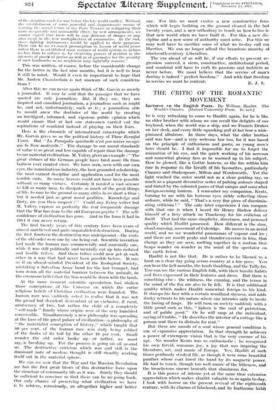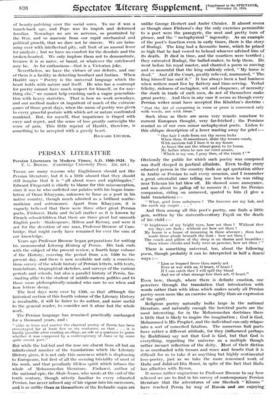THE CRITIC OF THE ROMANTIC MOVEMENT
Lectures en the English Poets. By William Hazlitt. The World's Classics. (Oxford University Press. 2s. net.) IT is very refreshing to come to Hazlitt again, for he is like an elder brother with whom we can recall the delights of our boyhood, when the world was a ship, and we Francis Drakes on her deck, and every little squarking gull at her bow a wide- pinioned albatross. In those days, what the elder brother said was law—and a very welcome law too, for it was based on the principle of enthusiasm and gusto, as young men's laws should be. I fmd it impossible for me to forget the animation of- his eye, and the quick working of his nervous and somewhat gloomy face as he warmed up to his subject. How he glowed, like a Gothic lantern, as the fire within him rose in response to the breath of his favourites, particularly Chaucer and Shakespeare. Milton and Wordsworth. Yet the light reached the outer world not as a clear guiding ray, so much as a piquant decorative series of pulsing ardours shaped and tinted by the coloured panes of that unique and somewhat foreign-seeming lantern. I remember my companion, Keats, turning to me with his lustrous eyes richly reflecting those ardours, while he said, " That's a very fine piece of discrimin- ating criticism ! " The only later experience I can compare with that one is when I heard Sir Henry Hadow deliver himself of a fiery attack on Thackeray for his criticism of Swift. That had the same simplicity, directness, and personal quality which Hazlitt possessed. How different is the slow, cloud-massing, movement of Coleridge. He moves in an aerial world, and we see wonderful panoramas of vapour and ice ; and there are roselit peaks and thunder-caverns in him, that change as they are seen, melting together in a motion that heaps wonder on wonder in the mind of the spectator on the earth below.
Hazlitt is not like that. He is rather to be likened to a hunt on a clear day going across country at a fine pace. You can hear the bell mouths, the hoofs thudding, and the Tally-ho. You can see the various English folk, with their bucolic habits and lives expressed in their features and dress. But there is something else : the wildness, the cunning, and the terror in the mind of the fox are also to be felt. It is that additional quality which makes Hazlitt somewhat foreign to his kind, It stamps his face with a certain woodland shyness, and adds dusky retreats to his nature where one intrudes only to invite the baring of fangs. He will turn on society suddenly with a little growl such as this, " Spleen is the soul of patriotism, and of public good." Or he will snap at the individual, saying of Crabbe, " He describes the interior of a cottage like a person sent there to distrain for rent."
But these are moods of a soul whose general condition is one of expansive appreciation. In that strength he achieves a power of extempore vision that is the very essence of his age. No wonder Keats was so enthusiastic ; he recognized his own fervid, sensuous joy, a joy that was inspiring the literature, art, and music of Europe. Yes, Hazlitt at such times perilously stroked life, as though it were some beautiful panther whose coat lured the hand by its magnetic power. He had to touch, though too well aware of the litheness, and the treacherous sinews beneath that slumbrous fur.
It is this power of intense yet at the same time extensive appreciation which makes Hazlitt valuable to us again to-day. I look with horror on the present revival of the eighteenth century, with its charms of falsehood, and its loathsome habit
of beauty-patching over the social sores. To me it was a hunch-back age, and Pope was its impish and deformed familiar. Nowadays we are so nervous, so prostrated by the War, and so anaemic from our rapid mechanical and political growth, that we dare not be sincere. We are brim- ming over with intellectual pity, salt fruit of an amoral fever for analysis ; but we have no comfort for the desolate and the broken-hearted. We only implore them not to demonstrate, because it is so naive, or banal, or whatever the catchword may be. As for enthusiasm—that is a Victorian joke.
Nevertheless, we have the virtues of our defects, and one of them is a facility in detecting bombast and fustian. When Ilazlitt says " Poetry is the universal language which the heart holds with nature and itself. He who has a contempt for poetry cannot have much respect for himself, or for any- thing else," we cannot help crushing such a vague generaliza- tion with heavy statistics. That is how we work nowadays, and our method makes us impatient of much of the extrava- gance of those great days, when the name of poetry was given to every graceful posture with which art or nature confronted mankind. But, for myself, that impatience is tinged with envy and regret, and the sense of loss greatly outweighs the sense of gain. This little reprint of Hazlitt, therefore, is something to be accepted with a greedy heart.
RI ell ARD CHURCH.



























































 Previous page
Previous page